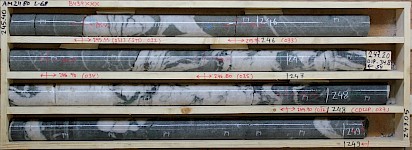Aurion Identifies New Zones and Extends Gold Mineralization at Aamurusko
- Gold mineralization extended to the northeast at Aamurusko NW
- Broad zone of gold mineralization intersected in gabbro - Gold in gabbro now encountered eight times over 1,000 m strike length
- New Gold Setting – Conglomerate hosted gold intersected in previously untested area
- Confirmation and extension of gold mineralized structures at Aamurusko Main with intervals up to 88.90 g/t Au over 0.40 m
- Drilling and base of till sampling programs to continue through 2021
St. John’s Newfoundland, July 29, 2021, Aurion Resources Ltd. (TSX VENTURE: AU) (OTCQX: AIRRF) (“Aurion” or the “Company”) announces results from drilling on the Aamurusko Discovery at its wholly owned Risti property located in the Central Lapland Greenstone Belt in northern Finland.
Summary
- Gold mineralization extended to the northeast at Aamurusko NW
- 2.40 g/t Au over 6.30 m from 246.40 m (AM21180), including 25.50 g/t Au over 0.40 m, 125 m above the previous intercept of 1.21 g/t Au over 24.75 m (AM20127).
- Broad zone of gold mineralization intersected in gabbro
- 0.70 g/t Au over 16.80 m from 331.85 m (AM21179), including 3.32 g/t Au over 0.75 m and 1.01 g/t Au over 6.85 m, in gabbro at Aamurusko Main.
- Gabbro hosted gold mineralization now encountered eight times over 1,000 m strike length.
- New Gold Setting – Conglomerate hosted gold mineralization intersected in previously untested area
- 3.75 g/t Au over 1.85 m from 111.40 m and 1.83 g/t Au over 2.40 m from 98.80 m (AM21177) in conglomerate approximately 200 m northeast of Aamurusko NW.
- Confirmation and extension of gold mineralized structures at Aamurusko Main with intervals up to 88.90 g/t Au over 0.40 m
- 29.06 g/t Au over 1.25 m from 68.15 m (AM21173), including 88.90 g/t Au over 0.40 m.
- All holes intersected targeted gold-bearing structure with quartz veining, 3/5 holes contained visible gold grains.
- Gold mineralized structures extend at least to 200 m vertical depth (AM21179).
- Parallel structures with gold potential identified
- Repetition of prospective stratigraphy (sediment, volcanic, gabbro) and parallel structures identified towards north over 1,000 m strike length.
- Zones of gold mineralization remain open in multiple directions at all target areas
- To date, 80% of all holes drilled at Aamurusko have intersected gold exceeding 1.0 g/t Au, 51% of drill holes over 3.0 g/t Au, 31% over 10.0 g/t Au
- Drilling and base of till sampling programs to continue through 2021
- Aurion is fully funded for the planned exploration activities until mid 2022
Comments
“Despite limitations due to weather, we were able to test new concepts at Aamurusko. Early results from 2021 have expanded the mineralized zones and support our view that significant and potentially economic gold mineralization will not be solely associated to quartz veining in clastic sediments and that many lithologies at Aamurusko are prospective for gold,“ commented Matti Talikka, Aurion’s CEO. “With this new knowledge, we look forward to returning in Q3 to expand the mineralized footprint at Aamurusko.”
Images and figures referred to in this release can be found at the following link: https://www.aurionresources.com/site/assets/files/1393/2107-nrfigures.pdf.
Discussion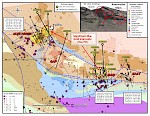 Aurion has completed Phase 1 of the 2021 diamond core drilling program at the Aamurusko prospect. The program was designed to test the extensions and orientations of gold bearing structures at the Aamurusko Main area and to provide information on an over 1,000 m long section of a potential parallel structure located to the north of previously drill tested areas. Locations of drill holes are presented in Figure 1.
Aurion has completed Phase 1 of the 2021 diamond core drilling program at the Aamurusko prospect. The program was designed to test the extensions and orientations of gold bearing structures at the Aamurusko Main area and to provide information on an over 1,000 m long section of a potential parallel structure located to the north of previously drill tested areas. Locations of drill holes are presented in Figure 1.
Phase 1 of the drill program commenced in late March 2021, was limited to 12 holes totaling 2,921.10 m, and was the first opportunity to return to drilling at Aamurusko since the COVID pandemic forced the Company to suspend drilling there in early 2020. 10 holes reached the target depth, and two holes were terminated in a wide zone of saprolite before reaching the targeted depth.
A snow road was constructed to enable access for a track mounted drill rig to drill sites located in the mid and top parts of the hill. Lower than normal snowfall and mild weather prohibited access to certain drill sites, which are planned to be tested during the latter half of 2022.The ability to use track mounted drill rigs increases the efficiency and decreases costs compared to helicopter supported drilling.
All completed holes intersected zones of gold mineralization. A summary of the gold intercepts (above 1.0 g/t Au) is presented in Table 1. See descriptions below for each of the target areas.
Table 1: Aamurusko Drilling Result Summary
| Aamurusko Drilling Result Summary | ||||||||
| Hole ID | Azimuth | Dip | From (m) | To (m) | Width (m) | Au (g/t) | Target Area | Comments |
| AM21169 | 180.7 | -71.0 | 29.80 | 31.80 | 2.00 | 4.51 | Aamurusko Main | |
| and | 63.00 | 63.40 | 0.40 | 2.86 | ||||
| AM21170 | 178.3 | -56.8 | 76.40 | 76.75 | 0.35 | 2.38 | Aamurusko Main | |
| AM21171 | 177.3 | -75.0 | 155.95 | 156.40 | 0.45 | 1.47 | Aamurusko Main | VG observed |
| AM21172 | 178.2 | -56.2 | 76.90 | 77.75 | 0.85 | 1.04 | Aamurusko Main | |
| AM21173 | 189.2 | -60.8 | 63.40 | 64.25 | 0.85 | 1.90 | Aamurusko Main | |
| and | 68.15 | 69.40 | 1.25 | 29.06 | ||||
| incl. | 68.40 | 68.80 | 0.40 | 88.90 | VG observed | |||
| AM21177 | 181.3 | -40.5 | 98.80 | 101.20 | 2.40 | 1.83 | Aamurusko NW | |
| and | 111.40 | 113.25 | 1.85 | 3.75 | ||||
| AM21178 | 196.6 | -40.1 | 294.80 | 297.20 | 2.40 | 1.61 | Aamurusko NW | |
| AM21179 | 180.3 | -50.2 | 331.85 | 348.65 | 16.80 | 0.70 | Aamurusko Main | |
| incl. | 331.85 | 338.70 | 6.85 | 1.01 | ||||
| AND incl. | 347.90 | 348.65 | 0.75 | 3.32 | ||||
| AM21180 | 153.3 | -40.0 | 133.90 | 135.30 | 1.40 | 1.36 | Aamurusko NW | |
| and | 237.70 | 238.35 | 0.65 | 4.99 | ||||
| and | 246.40 | 252.70 | 6.30 | 2.40 | ||||
| incl. | 246.40 | 246.80 | 0.40 | 25.50 | VG observed | |||
| and | 365.20 | 365.80 | 0.60 | 2.15 | ||||
| All widths are core widths. True width is not known at this time. All assay values are uncut. | ||||||||
| Screen assays have not been completed for AM21177 onwards. | ||||||||
Aamurusko Main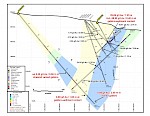 Drill holes AM21169-AM21173 targeted the Aamurusko Main zone with an aim to test the continuations of the sheared contact between gabbro and clastic sediments, and to provide information on the orientation of the gold bearing structures. The holes were collared in the mid part of the hill and drilled towards south.
Drill holes AM21169-AM21173 targeted the Aamurusko Main zone with an aim to test the continuations of the sheared contact between gabbro and clastic sediments, and to provide information on the orientation of the gold bearing structures. The holes were collared in the mid part of the hill and drilled towards south.
All holes intersected the targeted sheared contact between gabbro and clastic sediments at expected locations. All holes also intersected significant zones of quartz veining with gold values exceeding 1.0 g/t (Figures 2 & 3). Visible gold grains were observed in three (AM21171, AM21172 and AM21173) of the five holes.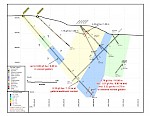
Gold mineralization was encountered at the sheared and quartz-veined gabbro-sediment contact and within quartz veins in clastic sediments. AM21173 intersected 29.06 g/t Au over 1.25 m from 68.15 m including 88.90 g/t Au over 0.40 m within a quartz vein adjacent to the gabbro-sediment contact (Figure 2, Photo 1). AM21169 intersected 4.51 g/t Au over 2.00 m from 29.80 m within quartz veined clastic sediment.
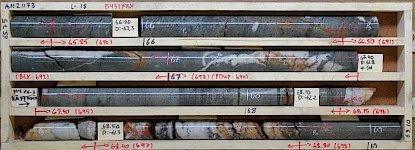 The drill holes provided new orientation data for the gold-bearing structures and quartz veins, as well as confirmed the continuity of the mineralization at the gabbro-sediment contact.
The drill holes provided new orientation data for the gold-bearing structures and quartz veins, as well as confirmed the continuity of the mineralization at the gabbro-sediment contact.
To date, drilling has identified a panel of minimum size of 200 m strike length by 200 m depth of gold prospective structures at Aamurusko with the mineralization open at most orientations.
150-350 m north of Aamurusko Main
Drill holes AM21175, AM21176 and AM21179 were collared 150 to 350 m north of the previously drill tested area at Aamurusko Main. The drill holes were designed to test the stratigraphy and the potential existence of parallel structures north of Aamurusko Main.
AM21175 was terminated at 135.80 m within a zone of saprolite before reaching the target depth. The presence of saprolite may indicate the presence of a structure and/or lithological contact.
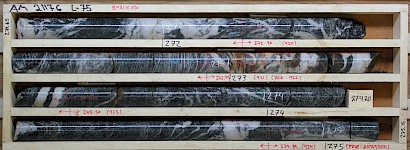 AM21176 and AM21179 were successful in identifying the repetition of the stratigraphy, compared to the Aamurusko Main area, including clastic sediments and gabbro with shearing and veining within the lithologies and along their contacts. The zones with shearing and quartz veining returned elevated gold values up to 0.40 g/t (Figures 2 & 3, Photo 2). The repetition and shearing of the lithologies may have been caused by thrust/reverse faults and/or folding during the compressional deformation stage which was followed by an extensional deformation phase that created pathways for gold-bearing fluids.
AM21176 and AM21179 were successful in identifying the repetition of the stratigraphy, compared to the Aamurusko Main area, including clastic sediments and gabbro with shearing and veining within the lithologies and along their contacts. The zones with shearing and quartz veining returned elevated gold values up to 0.40 g/t (Figures 2 & 3, Photo 2). The repetition and shearing of the lithologies may have been caused by thrust/reverse faults and/or folding during the compressional deformation stage which was followed by an extensional deformation phase that created pathways for gold-bearing fluids.
These observations indicate that there is potential for parallel gold bearing structures along the sediment-volcanic domain boundary that extends several kilometers to the east and west from Aamurusko.
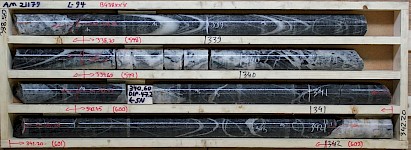 AM21176 and AM21179 were extended towards the south to test for potential depth and strike continuations of the previously identified gold-bearing structures at Aamurusko Main. Both holes intersected the sheared sediment-gabbro contact at 190-255 m below the surface with associated elevated gold values up to 0.69 g/t Au over 1.00 m. The drillholes also intersected zones of gold mineralization associated with abundant quartz veining and sulphide (e.g. arsenopyrite, galena, sphalerite) mineralization within the footwall gabbro. Drill hole AM21179 returned a broad intercept of 0.70 g/t Au over 16.80 m from 331.85 m including 3.32 g/t Au over 0.75 m (Photo 3) and drill hole AM21176 returned 0.69 g/t Au over 2.00 m from 393.7 m. Similar style of gold mineralization has been previously observed in seven drill holes that have intersected gabbro at Aamurusko Main, Gap Zone and Aamurusko NW over 1,000 m strike length.
AM21176 and AM21179 were extended towards the south to test for potential depth and strike continuations of the previously identified gold-bearing structures at Aamurusko Main. Both holes intersected the sheared sediment-gabbro contact at 190-255 m below the surface with associated elevated gold values up to 0.69 g/t Au over 1.00 m. The drillholes also intersected zones of gold mineralization associated with abundant quartz veining and sulphide (e.g. arsenopyrite, galena, sphalerite) mineralization within the footwall gabbro. Drill hole AM21179 returned a broad intercept of 0.70 g/t Au over 16.80 m from 331.85 m including 3.32 g/t Au over 0.75 m (Photo 3) and drill hole AM21176 returned 0.69 g/t Au over 2.00 m from 393.7 m. Similar style of gold mineralization has been previously observed in seven drill holes that have intersected gabbro at Aamurusko Main, Gap Zone and Aamurusko NW over 1,000 m strike length.
The existence of gold mineralized zones within gabbro is highly encouraging as gabbro is a favorable host rock for orogenic gold mineralization and gabbro bodies have been observed over several kilometers along the domain boundary between sedimentary and volcanic rocks.
100 m north of Aamurusko East
AM21174 was collared approximately 100 m north from previous drill holes at the Aamurusko East area and targeted a potential NE-SW trending structure to the north of the previously tested area. The drill hole intersected clastic sediments before entering into saprolite at around 110 m down hole. The drill hole was terminated within the saprolite zone at 135.8 m. The saprolite may indicate the presence of a structure and/or lithological contact. The drill hole intersected intervals with anomalous (>0.1 g/t) gold values.
200 m north of Gap Zone
AM21178 was collared on top of the hill approximately 200 m northeast from the Gap Zone target. The drill hole was designed to test the stratigraphy and the potential existence of parallel structures north of the Gap Zone target area. The gold mineralization at the Gap Zone target was identified via four shallow drill holes completed in 2020 (Press release Apr 22, 2020).
AM21178 intersected clastic sediments and ultramafic rocks separated by a sheared contact from the southern clastic sediment unit interpreted to be associated with the Gap Zone mineralization. The observations indicate the existence of repetition of stratigraphy and existence of parallel structures.
Drill hole AM21178 returned an intercept of 1.61 g/t Au over 2.40 m from 294.60 m suggesting that gold mineralized structures at Gap Zone extend over 100 m below the previous gold intersects. AM21178 was drilled at a suboptimal angle to the orientation of the observed veins and stockwork. Further drill holes with more suitable orientations have been planned to test the Gap Zone target during the second half of 2021.
200 m north of Aamurusko NW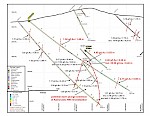 AM21177 was collared approximately 200 m NE of Aamurusko NW target and targeted a previously untested area. The drill hole intersected clastic sediments, conglomerate and greywacke followed by a mafic volcanic unit with shearing and other conglomerate and greywacke units. Intersections in conglomerate returned 3.75 g/t Au over 1.85 m from 111.40 m, 1.83 g/t Au over 2.40 m from 98.80 m and 0.93 g/t Au over 3.00 m from 303.00 m. The intercepts represent the first conglomerate hosted gold mineralization encountered at Aamurusko and extend the envelope with zones of gold mineralization to the north.
AM21177 was collared approximately 200 m NE of Aamurusko NW target and targeted a previously untested area. The drill hole intersected clastic sediments, conglomerate and greywacke followed by a mafic volcanic unit with shearing and other conglomerate and greywacke units. Intersections in conglomerate returned 3.75 g/t Au over 1.85 m from 111.40 m, 1.83 g/t Au over 2.40 m from 98.80 m and 0.93 g/t Au over 3.00 m from 303.00 m. The intercepts represent the first conglomerate hosted gold mineralization encountered at Aamurusko and extend the envelope with zones of gold mineralization to the north.
Drill hole AM21180 was collared approximately 200 m north of Aamurusko NW target and is an upper cut hole for AM20127. AM21180 contained visible gold grains and returned intercepts of 1.36 g/t Au over 1.40 m from 133.90 m, 4.99 g/t Au over 0.65 m from 237.70 m, 2.40 g/t Au over 6.30 m from 246.40 m including 25.5 g/t Au over 0.40 m, and 2.15 g/t Au over 0.60 m from 365.20 m (Figure 4 & Photo 4).
The new intercept of 2.40 g/t Au over 6.30 m is 125 m above the intercept of 1.21 g/t Au over 24.75 m (AM20127). These intercepts may represent down-plunge continuation of the Aamurusko NW mineralization towards northeast at a moderate angle.
AM21180 also intersected a zone of highly sheared mafic volcanics containing abundant quartz-carbonate veining with elevated gold up to 2.15 g/t Au over 0.60 m from 365.20 m.
The observed lithologies and the existence of shear zones indicate that, in the Aamurusko NW area, similar to that observed at Aamurusko Main, there is repetition of the stratigraphic sequence and parallel structures with gold potential.
2021 exploration program
The second phase of the 2021 drilling program is underway at the Launi East property with an aim to test several target areas including the Hinge Zone Prospect, which was discovered in 2020. Following the completion of phase 2 at Launi East, the drilling will resume at Aamurusko with an aim to test the extensions of the mineralized zones at Gap Zone and Aamurusko NW targets and follow up drilling of identified gold-bearing zones within gabbro.
In addition, a regional base of till sampling program is ongoing and targeting previously unexplored areas with the potential of the existence of mafic-ultramafic hosted gold mineralizations such as Rupert Resources’ Ikkari discovery.
Quality Assurance, Quality Control and Qualified Person
All samples were delivered to ALS preparation facility in Sodankylä, Finland where sample preparation work was completed. All analytical work was completed at ALS facility in Loughrea, Ireland and Rosia Montana, Romania. ALS is an internationally accredited lab and are ISO compliant (ISO 9001:2008, ISO/IEC 17025:2005). All samples were analyzed for gold using the Au-AA26 procedure (50 g fire assay with AAS finish: Lower Detection Limit (“LDL”) 0.01 g/t gold; Upper Detection Limit (“UDL”) 100 g/t gold). Any samples that returned over-limit values (>100 g/t gold), fire assay values of ≥3 g/t gold or had visible gold observed were analyzed by Au-SCR24 1kg, Screen Fire Assay Au (0.05-1,000 ppm) by 1kg screen fire assay (50 g nominal sample weight). The sample pulp (1kg) is passed through a 100-micron stainless steel screen. Any material remaining on the screen (>100 micron) is retained and analyzed in its entirety by fire assay with gravimetric finish and reported as the Au (+) fraction. The material passing through the screen (<100 micron) is homogenized and two sub-samples are analyzed by fire assay with AAS finish. The average of the two AAS results is taken and reported as the Au (-) fraction result. All three values are used in calculating the combined gold content of the plus and minus fractions. The gold values for both the (+) 100 and (-) 100 micron fractions are reported together with the weight of each fraction as well as the calculated total gold content of the sample. Multi-element analysis (ME-ICP61, four-acid digestion, 35 element ICP-AES) was completed on all samples. Certified standards and blanks were inserted every 20 samples. ALS has its own QA/QC protocol using standards, blanks and duplicates.
This news release has been reviewed by Andrew Hussey, P.Geo., GIS Geologist and Database Manager for Aurion Resources, a Qualified Person as defined by National Instrument 43-101. For more information on these projects please visit our website at www.aurionresources.com.
About Aurion
Aurion is a Canadian exploration company listed on the TSX Venture Exchange (TSX-V:AU) and OTCQX Best Market (OTCQX: AIRRF). Aurion’s strategy is to generate or acquire early-stage precious metals exploration opportunities and advance them through direct exploration by our experienced team or by business partnerships and joint venture arrangements. Aurion’s current focus is exploring on its Flagship Risti and Launi projects in Finland.
On behalf of the Board of Directors,
Matti Talikka, Chief Executive Officer
For further information, please email:
info@aurionresources.ca
Neither the TSX Venture Exchange nor its Regulation Services Provider (as that term is defined in the policies of the TSX Venture Exchange) accepts responsibility for the adequacy or accuracy of this release.

